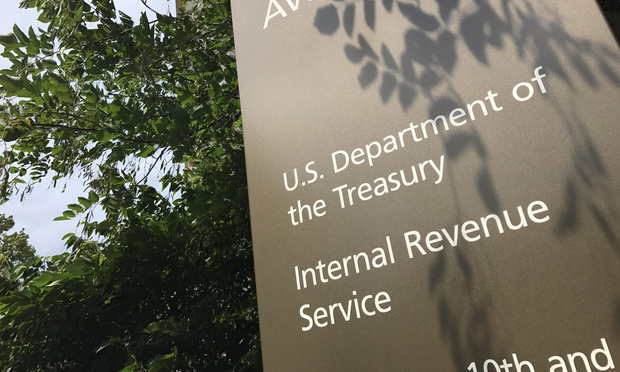US Appeals Court Urged to Curb IRS Sway Over Cannabis Industry
"This court has embarked upon a very dangerous, unprecedented grant of authority. The implications are far reaching," lawyers for a medical marijuana business in Colorado argue in the U.S. Court of Appeals for the Tenth Circuit.
August 20, 2018 at 06:38 PM
4 minute read
 IRS headquarters in Washington, D.C. (Photo: Mike Scarcella/ ALM)
IRS headquarters in Washington, D.C. (Photo: Mike Scarcella/ ALM)
A Colorado law firm is pressing claims that the Internal Revenue Service wields too much power over the cannabis industry, urging a federal appeals court to curb the agency's authority to unilaterally determine that state-legal businesses are breaking federal law.
Thorburn Walker LLC, a firm that has become go-to tax counsel for many Colorado dispensaries, has asked the U.S. Court of Appeals for the Tenth Circuit to reconsider a panel decision in Alpenglow Botanicals v. United States of America. The three-judge panel on July 3 said a taxpayer does not have to be convicted of a drug crime for the IRS to revoke its ability to deduct marijuana business expenses.
“The court has taken the unprecedented step of empowering the IRS to not only investigate nontax crimes for tax administration purposes but to administratively determine that the crimes have been committed,” James Thorburn and Richard Walker wrote in their rehearing petition. “No court has previously given the IRS such administrative power.”
The request for rehearing is the law firm's latest attempt to find judicial relief for cannabis clients hurt by tax auditors' findings under Section 280E of the Internal Revenue Code. The law bars companies from deducting ordinary business expenses if the filer is found to be “trafficking” in Schedule 1 substances. While Colorado and other states allow licensed marijuana businesses to operate legally, the IRS has determined that the activity is illegal for tax purposes.
Thorburn and Walker's previous efforts to curb the IRS power have faced similar obstacles in federal court.
In Standing Akimbo v. United States of America, a magistrate judge of the U.S. District Court for Colorado recommended this month that a dispensary's owners push to quash a summons for business records be denied. The owners argued that providing the records, without absolute immunity from criminal charges, would be a violation of their Fifth Amendment rights.
The U.S. Supreme Court in March denied review in Green Retail Solution v. United States of America, a dispensary chain's unsuccessful challenge to the IRS' authority to investigate whether a state-legal business is engaged in illegal federal drug trafficking.
In Alpenglow Botanicals, the father-son owners of a Colorado “farm to flame” cannabis operation sued to block the IRS' finding that they owed a combined $53,000 for improper tax deductions taken for their state-licensed business. Charles Williams and Justin Williams argued that Section 280E violates the Eighth and Sixteenth amendments and that the IRS can't cite 280E unless there has already been a criminal finding of trafficking. The court rejected those arguments.
“Alpenglow offers no reason why we should conclude the IRS has the authority to assess taxes under Section 280E, but cannot impose excess tax liability under Section 280E,” the appeals panel wrote. “There is also no evidence that Congress intended to limit the IRS's investigatory power.”
Thorburn and Walker called the reach of the appeals court ruling “dangerous” and “unprecedented.”
Jim Hunt, an attorney at Harris Bricken in Seattle noted in a July 20 blog that the Tenth Circuit's ruling—that Congress expressed no intent to limit IRS power—goes even further than the court did in Green Retail.
“This decision is going to shift how cannabis businesses pay their taxes and how cannabis tax lawyers view cannabis tax obligations,” Hunt wrote. “And not in a good way.”
Read more:
Why Patent Lawyers Are Watching This Colorado Cannabis Case
Brownstein Hyatt Partner Discloses Income as Colorado US Attorney Pick
Appeals Court Confronts Clash Over Pot Laws, and Feds Win
Meet Orrick's Brian Moran, Trump's Pick for Seattle US Attorney
US Justice Dept. Defends IRS Power in Marijuana Dispensary's Tax Case
➤➤ Get the latest cannabis lawyering, compliance and commentary straight to your inbox with Higher Law, a new Law.com briefing. Learn more and sign up here.
This content has been archived. It is available through our partners, LexisNexis® and Bloomberg Law.
To view this content, please continue to their sites.
Not a Lexis Subscriber?
Subscribe Now
Not a Bloomberg Law Subscriber?
Subscribe Now
NOT FOR REPRINT
© 2025 ALM Global, LLC, All Rights Reserved. Request academic re-use from www.copyright.com. All other uses, submit a request to [email protected]. For more information visit Asset & Logo Licensing.
You Might Like
View All
FTC, FDA Warn Hemp Shops About Selling THC Products Resembling Kid's Food
4 minute read


Blank Rome Recruits 25 Burns & Levinson Lawyers to Launch Boston Office
Trending Stories
- 15th Circuit Considers Challenge to Louisiana's Ten Commandments Law
- 2Crocs Accused of Padding Revenue With Channel-Stuffing HEYDUDE Shoes
- 3E-discovery Practitioners Are Racing to Adapt to Social Media’s Evolving Landscape
- 4The Law Firm Disrupted: For Office Policies, Big Law Has Its Ear to the Market, Not to Trump
- 5FTC Finalizes Child Online Privacy Rule Updates, But Ferguson Eyes Further Changes
Who Got The Work
J. Brugh Lower of Gibbons has entered an appearance for industrial equipment supplier Devco Corporation in a pending trademark infringement lawsuit. The suit, accusing the defendant of selling knock-off Graco products, was filed Dec. 18 in New Jersey District Court by Rivkin Radler on behalf of Graco Inc. and Graco Minnesota. The case, assigned to U.S. District Judge Zahid N. Quraishi, is 3:24-cv-11294, Graco Inc. et al v. Devco Corporation.
Who Got The Work
Rebecca Maller-Stein and Kent A. Yalowitz of Arnold & Porter Kaye Scholer have entered their appearances for Hanaco Venture Capital and its executives, Lior Prosor and David Frankel, in a pending securities lawsuit. The action, filed on Dec. 24 in New York Southern District Court by Zell, Aron & Co. on behalf of Goldeneye Advisors, accuses the defendants of negligently and fraudulently managing the plaintiff's $1 million investment. The case, assigned to U.S. District Judge Vernon S. Broderick, is 1:24-cv-09918, Goldeneye Advisors, LLC v. Hanaco Venture Capital, Ltd. et al.
Who Got The Work
Attorneys from A&O Shearman has stepped in as defense counsel for Toronto-Dominion Bank and other defendants in a pending securities class action. The suit, filed Dec. 11 in New York Southern District Court by Bleichmar Fonti & Auld, accuses the defendants of concealing the bank's 'pervasive' deficiencies in regards to its compliance with the Bank Secrecy Act and the quality of its anti-money laundering controls. The case, assigned to U.S. District Judge Arun Subramanian, is 1:24-cv-09445, Gonzalez v. The Toronto-Dominion Bank et al.
Who Got The Work
Crown Castle International, a Pennsylvania company providing shared communications infrastructure, has turned to Luke D. Wolf of Gordon Rees Scully Mansukhani to fend off a pending breach-of-contract lawsuit. The court action, filed Nov. 25 in Michigan Eastern District Court by Hooper Hathaway PC on behalf of The Town Residences LLC, accuses Crown Castle of failing to transfer approximately $30,000 in utility payments from T-Mobile in breach of a roof-top lease and assignment agreement. The case, assigned to U.S. District Judge Susan K. Declercq, is 2:24-cv-13131, The Town Residences LLC v. T-Mobile US, Inc. et al.
Who Got The Work
Wilfred P. Coronato and Daniel M. Schwartz of McCarter & English have stepped in as defense counsel to Electrolux Home Products Inc. in a pending product liability lawsuit. The court action, filed Nov. 26 in New York Eastern District Court by Poulos Lopiccolo PC and Nagel Rice LLP on behalf of David Stern, alleges that the defendant's refrigerators’ drawers and shelving repeatedly break and fall apart within months after purchase. The case, assigned to U.S. District Judge Joan M. Azrack, is 2:24-cv-08204, Stern v. Electrolux Home Products, Inc.
Featured Firms
Law Offices of Gary Martin Hays & Associates, P.C.
(470) 294-1674
Law Offices of Mark E. Salomone
(857) 444-6468
Smith & Hassler
(713) 739-1250










